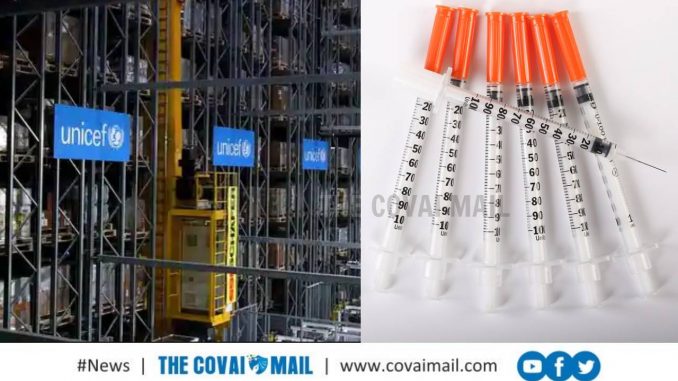
As the world awaits a COVID-19 vaccine, UNICEF has begun laying the groundwork for the rapid, safe and efficient delivery of the eventual vaccine by purchasing and pre-positioning syringes and other necessary equipment.

As soon as COVID-19 vaccines successfully emerge from trials and are licensed and recommended for use, the world will need as many syringes as doses of vaccine. To begin preparations, this year, UNICEF will stockpile 520 million syringes in its warehouses, part of a larger plan of 1 billion syringes by 2021, to guarantee initial supply and help ensure that syringes arrive in countries before the COVID-19 vaccines.
During 2021, assuming there are enough doses of COVID-19 vaccines, UNICEF anticipates delivering over 1 billion syringes to support COVID-19 vaccination efforts on top of the 620 million syringes that UNICEF will purchase for other vaccination programmes against other diseases such as measles, typhoid and more..
Besides syringes, UNICEF is also buying 5 million safety boxes so that used syringes and needles can be disposed in a safe manner by personnel at health facilities, thus preventing the risk of needle stick injuries and blood borne diseases. Every safety box carries 100 syringes. Accordingly, UNICEF is “bundling” the syringes with safety boxes to ensure enough safety boxes are available to go along with the syringes.
Injection equipment such as syringes and safety boxes have a shelf life of five years. Lead-times for such equipment are also long as these items are bulky and need to be transported by sea freight. Vaccines, which are heat sensitive, are normally transported more quickly by air freight. In addition to saving time, early purchase of syringes and safety boxes also reduces pressure on the market and pre-empts potential early spikes in demand when vaccines do become available.
As the key procurement coordinator for Gavi, the Vaccine Alliance, UNICEF is already the largest single vaccine buyer in the world, procuring more than 2 billion doses of vaccines annually for routine immunization and outbreak response on behalf of nearly 100 countries. Every year, UNICEF provides vaccines for almost half of the world’s children and procures and supplies around 600-800 million syringes for regular immunization programmes. COVID-19 vaccines will likely treble or quadruple that number, depending on the number of COVID-19 vaccines that are ultimately produced and secured by UNICEF.
“Over two decades, Gavi has helped an additional 822 million children from the world’s most vulnerable countries access critical, life-saving vaccines,” said Seth Berkley, CEO of Gavi. “This would not have been possible without our partnership with UNICEF, and it is this same collaboration that will be essential to Gavi’s work with the COVAX Facility.”
To make sure that vaccines are transported and stored at the right temperature, UNICEF, along with WHO, is also mapping out existing cold chain equipment and storage capacity – in the private as well as public sector – and preparing necessary guidance for countries to receive vaccines.
